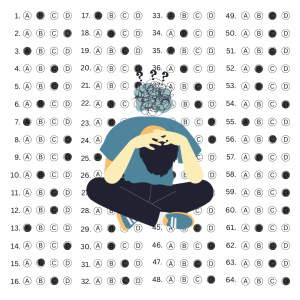Students Evaluate the Effectiveness of AP and IB Classes
May 22, 2023
Apprehensive warning lights flash on students’ dashboards as May looms, when intense study schedules and late-night review cramming, already characteristic to Westwood students, grow in severity. The imminent stress overwhelming the halls and plaguing students indicates Advanced Placement (AP) and International Barriculate (IB) testing season has begun.
College Board’s AP program aims to give high school students a glimpse into college academics and course rigor, and help students discover passions.
“Taking AP can help you develop college skills [such as] time management, critical thinking, and scholarly writing,” the College Board Website said.
AP exams require a $97 starting fee, and those who score high, 3s, 4s, or 5s, are likely to earn college credit. With the ambition of most teachers being for students to get a 5 on the exam, the curriculum is often dictated by exam preparation rather than offering students an in-depth understanding of concepts. Learning based solely around acing a test raises questions about student retention of material and whether teachers should teach beyond what is covered on the exam.
Students were emailed a survey asking them to evaluate their experiences with the AP and IB curriculums.
“IB Economics is my favorite AP/IB class because of the way in which it is taught,” one anonymous student said. “Mr. Blaine [the AP and IB economics teacher] consistently emphasizes a method of learning in which students are encouraged to gain total ownership over their learning and fully understand every concept. We are thus actually learning, instead of just memorizing what is told to us like in some other classes.”
Teachers who are successful in balancing test preparation and deeper learning are praised when students receive high scores on their exams. However, teachers who attempt to stretch instruction beyond the prescribed curriculum at the expense of their students’ test scores receive backlash.
“If there were no exams, then learning the material would be better for the individual,” one student said. “On the other hand if there are exams, they determine many future possibilities, so teachers should prepare the students for the exam.”
Many students agree that an ideal AP class would balance teaching beyond the curriculum and adequate test preparation, or teach what will earn a student a 5 and offer additional learning resources if a student is interested.
“I think they should at least instruct you on how to achieve a high score on exams, like test-taking strategies and rubrics, but should put a greater attention on teaching content above and beyond,” one student said. “While some kids just take certain classes for the credit, lots of students are thoroughly interested in the topics being presented and content-based learning really allows students to have a greater grasp on their learning.”
Though some students would ideally like to learn outside the curriculum, AP exams are important to college applications, majors, and credits, meaning the significance of scoring well often outweighs deeper learning.
“I come to school to learn, so I like [to] learn as much information as possible,” one student said. “That being said, I would much prefer to actually pass an expensive test at the end of the year than not.”
The IB curriculum offers advanced learning while targeting concerns of AP regarding student retention and going beyond memorization, as the program stresses in-depth learning. However, with both curriculums there is great emphasis on the exams themselves, diminishing the value placed on learning for the sake of learning. The IB format that requires a certain number of Standard Level (SL) and Higher Level (HL) classes and a minimum score of 24/45 to receive the IB diploma only contributes to the desire to earn high test scores. AP offers the ability to pick and choose classes, so in theory, this pressure is alleviated, but with the current mindset that students must take as many AP exams as possible, its flexible nature is defeated.
“If AP was as unconventional in teaching as IB, but less pretentious, less emphasis on tests, and maintain[ed] an ability to pick and choose classes without committing a path (or requiring AP classes in everything) then it would be the best advanced curriculum,” one student said.
A greater focus on the “so what” aspect of a concept, and its meaning outside the interdisciplinary context of AP classes are priorities in IB. Most IB classes have a discussion-based structure, meaning learning is driven by students’ engagement. In addition, IB exams are almost completely free-response, which encourages more analytical thinking and allows students to take charge of their understanding.
“I think AP classes are very good and do prepare students, although they do have a problem in terms of prioritizing memorization and not teaching students how to reflect on their place in the world or how to articulate their own thinking as well,” one student said.
Despite the flaws in the AP program, it offers its fair share of benefits, such as typically consistent college credits. Furthermore, when surveyed, the majority of respondents (56.1%) said they are confident or very confident AP and IB classes are preparing them for college and beyond. The majority of responses (58.6%) also said they retain the information presented to them in AP and IB classes somewhat well or well.
However, 66.7% of respondents said that AP and IB tests are inaccurate representations of intelligence, showing the motivation for scoring high mostly comes from credits and other benefits offered to high-achieving marks.
“As a student who will have taken 14 AP exams by the time I graduate, I can honestly say that I can’t imagine high school without AP,” one student said. “I can’t foresee any alternative to AP that would maintain the same level of rigor while being consistent with the national standard. I believe that many students who seek to learn college content ahead would be at a serious disadvantage.”




